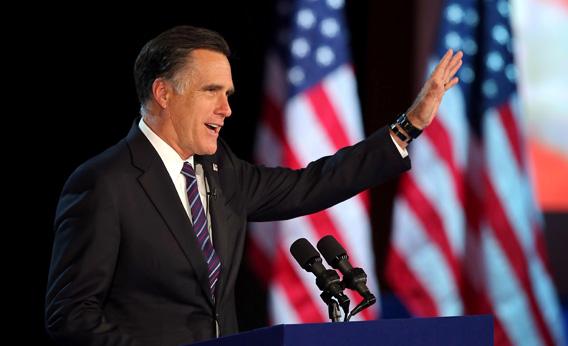 Mitt Romney only mentioned Obama?s name once and omitted traditional phrases like ?the people have spoken" in his speech
Mitt Romney only mentioned Obama?s name once and omitted traditional phrases like ?the people have spoken" in his speechPhotograph by Alex Wong/Getty Images.
Mitt Romney had not written a concession speech as of Tuesday afternoon, but was forced to acknowledge his loss after midnight on Wednesday morning. In less than five minutes, Romney ticked all of the historical concession-speech boxes: accept defeat, congratulate victor, look forward, call for unity. Who invented this concession ritual?
Al Smith. The modern presidential concession process has two elements: contacting the victor and addressing the public. Stephen Douglas became the first candidate to publicly acknowledge defeat when he urged the slave states to accept Lincoln?s victory in 1860, but he didn?t reach out to Lincoln. William Jennings Bryan was the first vanquished candidate to directly contact the victor on election night. He telegrammed William McKinley in 1896 that, ?We have extended the issue to the American people and their will is law.? Bryan did not, however, break the news to his disappointed supporters in an exhausted, heartfelt speech. Al Smith was the first candidate to combine these two elements when he telegrammed his concession to Herbert Hoover in 1928, then broadcast his concession remarks in a radio address. Adlai Stevenson gave the first televised concession speech in 1952.
Concessions speeches would have made little sense through most of the 19th century, when candidates pretended not to want the presidency?if you?re not engaged in a contest, there?s nothing to concede. But most historians now view the concession ritual as one of the most important moments in American politics. It informs supporters of the losing candidate that the struggle is over. Tuesday night was a clear example of this phenomenon, as many Romney partisans refused to accept the projected Ohio results until the candidate himself did so. It also gives the victor an opportunity to publicly laud the loser in the victory speech, reaching out to those who voted for his opponent.
The choreographed concession ritual, however, sometimes goes awry. Thomas Dewey refused to telegram a concession to Franklin Roosevelt in 1944. After the punctilious FDR learned Dewey had conceded in a radio interview, he privately called his defeated opponent a ?son of a bitch.? In 1916, Charles Evans Hughes waited two weeks before telegramming his concession to Woodrow Wilson, who noted that the message was ?a little moth-eaten when it got here but quite legible.?
Barry Goldwater delivered an unorthodox concession in 1964. He waited until the day after the election to concede, even though Lyndon Johnson had defeated him in a landslide. He also tempered his congratulatory remarks by reminding Johnson that he didn?t turn out as many voters as John F. Kennedy had four years earlier. Goldwater vowed to continue in opposition to LBJ?s policies, and called for an ?army? of young people to spring to his side.
Few concessions speeches are remembered, because the convention leaves little room for innovation. Author Scott Farris, who has chronicled the experiences of presidential also-rans, argues that candidates reveal their true feelings in small changes to the boilerplate concession language. In the first sentence of his long-delayed 2000 concession speech, for example, Al Gore congratulated George W. Bush on ?becoming? the president, rather than being ?elected? president. John McCain was widely lauded for giving the best concession speech in recent years. The Arizona senator went far beyond the ordinary accept-and-unite language, effusively praising Barack Obama and the historic nature of his victory. By contrast, Mitt Romney only mentioned the president?s name once and omitted traditional phrases like ?the people have spoken.?
Got a question about today?s news? Ask the Explainer.
Source: http://feeds.slate.com/click.phdo?i=4f6275d2657753f4a153d8cd32660bf0
cispa baltimore ravens space shuttle new york courtney upshaw russell wilson catch me if you can delmon young arrested
No comments:
Post a Comment
Note: Only a member of this blog may post a comment.